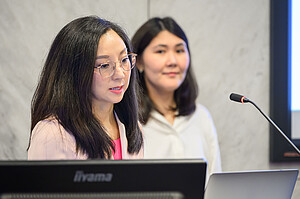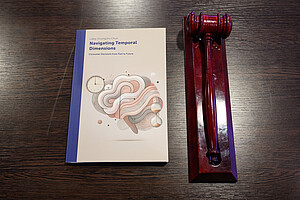PhD Defence Libby Chun

In her dissertation, Navigating Temporal Dimensions: Consumer Decisions from Past to Future, ERIM's Libby Chun extended the existing understanding of the influence of time information and temporal perception on consumer judgments. Libby demonstrated how task duration neglect affects consumer decision to act on now versus later; what beliefs consumers have about the temporal categorisation of recent action and whether this belief is aligned with their decisions in pursuing a goal; and whether consumer media preference changes when they reminisce about special events from the past. One key discovery from Libby's research is how consumers’ perceptions of time – encompassing past, present, and future – affect their cognitive and motivational processes in decision-making. Through her research, Libby highlighted several novel factors that explain consumer decision-making in the present, such as duration neglect, context-dependent temporal categorisation of actions, and emotional and motivational drivers for a recall. All in all, this research not only deepens our understanding of how time perception drives consumer behaviour but also offers practical strategies for improving our decision-making processes. By recognising these temporal and motivational factors, we can make better choices that align with our long-term goals, whether in our personal lives or as consumers navigating an increasingly complex marketplace.
Libby defended her dissertation in the Senate Hall at Erasmus University Rotterdam (EUR) on Wednesday, 30 October at 13:00. Her supervisors were dr. Bram van den Bergh (EUR), and dr. Christophe Lembregts (EUR). Other members of the Doctoral Committee were dr. Anouk Festjens (Maastricht University), prof.dr. Sam Maglio (University of Toronto), prof.dr. Kirsten Rohde (EUR), dr. Mirjam Tuk (EUR), and prof.dr.ing. Niels van de Ven (Tilburg University)
Thesis Abstract

This dissertation extends the existing understanding of the influence of time information and temporal perception on consumer judgements. The dissertation explores novel ideas on how consumers’ perceptions of time – encompassing between past, present, and future – affect their cognitive and motivational processes in decision-making.
This work builds on the rich literature on intertemporal choices, goal pursuits, motivations, temporal categorization, autobiography memory recall, and media richness theory. She shows how task duration neglect affects consumer decision to act on now versus later (Chapter 2), what beliefs consumers have about temporal categorization of recent action and whether this belief is aligned with their decisions in pursuing a goal (Chapter 3), and whether consumer media preference changes when they reminisce about special events from the past (Chapter 4).
In sum, this dissertation highlights several novel factors that explain consumer decision making in the present, such as neglect for the duration, context dependent temporal categorization of actions, and emotional and motivational drivers for a recall. By doing so, it contributes to a more comprehensive understanding of consumer behavior across different temporal dimensions, with practical implications for enhancing decision-making strategies.
View photos of Libby's PhD Defence
Photos: Rick Keus / Rick Keus Fotografie


